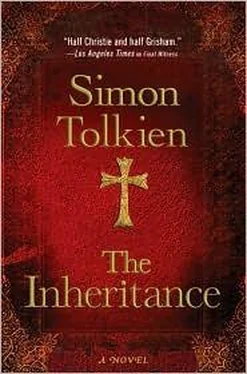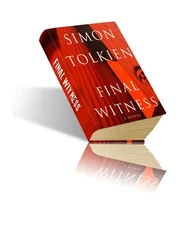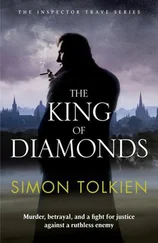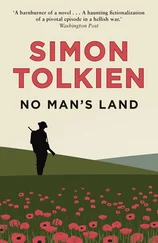Simon Tolkien - The Inheritance
Здесь есть возможность читать онлайн «Simon Tolkien - The Inheritance» — ознакомительный отрывок электронной книги совершенно бесплатно, а после прочтения отрывка купить полную версию. В некоторых случаях можно слушать аудио, скачать через торрент в формате fb2 и присутствует краткое содержание. Жанр: Полицейский детектив, на английском языке. Описание произведения, (предисловие) а так же отзывы посетителей доступны на портале библиотеки ЛибКат.
- Название:The Inheritance
- Автор:
- Жанр:
- Год:неизвестен
- ISBN:нет данных
- Рейтинг книги:4 / 5. Голосов: 1
-
Избранное:Добавить в избранное
- Отзывы:
-
Ваша оценка:
- 80
- 1
- 2
- 3
- 4
- 5
The Inheritance: краткое содержание, описание и аннотация
Предлагаем к чтению аннотацию, описание, краткое содержание или предисловие (зависит от того, что написал сам автор книги «The Inheritance»). Если вы не нашли необходимую информацию о книге — напишите в комментариях, мы постараемся отыскать её.
The Inheritance — читать онлайн ознакомительный отрывок
Ниже представлен текст книги, разбитый по страницам. Система сохранения места последней прочитанной страницы, позволяет с удобством читать онлайн бесплатно книгу «The Inheritance», без необходимости каждый раз заново искать на чём Вы остановились. Поставьте закладку, и сможете в любой момент перейти на страницу, на которой закончили чтение.
Интервал:
Закладка:
Trave could hear the impatience in the prosecutor’s voice, but he still hesitated before beginning his reply. It was the question he’d asked himself a thousand times or more during the four months that had passed since he’d first seen the dead man, sitting bolt upright in his high-backed armchair, gazing out over a game of chess into nothing at all. Shot in the head. Detective Inspector Trave knew what he’d found, all right. He just didn’t know what it meant. Not in his bones, not where it mattered. Pieces of the jigsaw fit too well, and others didn’t fit at all. Everything pointed to Stephen Cade as the murderer, but why had he called out for help after killing his father? Why had he waited to open the door to his accusers? Why had he not tried to escape? Trave remembered how Stephen had gripped the table at the end of their last interview in Oxford Police Station, shouting over and over again until he was hoarse: “I didn’t do it I tell you. I didn’t kill him. I hated my father, but that doesn’t make me a murderer.”
Trave had got up and left the room, told the sergeant at the desk to charge the boy with murder, and walked out into the night. And he hadn’t slept properly ever since.
Thompson, of course, had no such doubts. Trave remembered the first thing the prosecution counsel had told him when the case was being prepared for trial: “There’s something you should know about me, Inspector,” he’d said in that nasal bullying tone with which Trave had now become so familiar. “I don’t suffer fools gladly. I never have and I never will.”
And Trave was a fool. Thompson hadn’t taken long to form that opinion. The art of prosecution was about following the straight and narrow, keeping to the path through the woods until you got to the hanging tree on the other side. Defence lawyers spent their time trying to sidetrack witnesses and throw smoke in the jurors’ eyes to keep them from the truth. Trave was the officer in the case. It was his duty not to be sidetracked, to keep his language plain and simple, to help the jury do its job. And here he was: hesitant and uncertain before he’d even begun.
Thompson cleared his throat and glowered at his witness.
“Tell us about the deceased, Inspector Trave,” he demanded. “Tell us what you found.”
“He’d been shot in the head.”
“How many times?”
“Once.”
“Where in the head?”
“In the forehead.”
“Did you find the gun?”
“Yes, it was on a side table, with a silencer attached. The defendant said he’d put it there after picking it up from the floor near the french windows, when he came back into the study from the courtyard.”
“That was the story he told you?”
“Yes, I interviewed him the next day at the police station.
“His fingerprints were on the gun. That’s right, isn’t it?”
“Yes.”
“And on the key that he admitted he turned in order to unlock the door into the corridor. The defendant told you that as well in his interview, didn’t he, Inspector?”
“Yes. He said the door was locked and so he opened it to let Mr. Ritter into the study.”
“Tell us who Mr. Ritter is.”
“He was a friend of Professor Cade’s. They fought together in the war. He and his wife had been living at the manor house for about seven years, as I understand it. Mrs. Ritter acted as the housekeeper. They had the bedroom above the professor’s study, overlooking the main courtyard.”
“Thank you, Inspector. All the fingerprint evidence is agreed, my lord.”
“I’m glad to hear it,” said the judge, in a tone that suggested he’d have had a great deal to say if it hadn’t been. His Honour Judge Murdoch looked furious already, Thompson noted with approval. Strands of grey hair stuck out at different angles from under his old horsehair wig, and his wrinkled cheeks shone even redder than usual. They were the legacy of a lifetime of excessive drinking, which had done nothing to improve the judge’s temper. Defendants, as he saw it, were guilty and needed to be punished. Especially this one. People like Stephen Cade’s father had fought in two world wars to defend their country. And for what? To see their sons rebel, take drugs, behave indecently in public places. Stephen Cade had made a mistake not cutting his hair for the trial. Judge Murdoch stared at him across the well of the court and decided that he’d never seen a criminal more deserving of the ultimate punishment. The little bastard had killed his father for money. There was no worse crime than that. He’d hang. But first he’d have his trial. A fair trial. Judge Murdoch would see to that.
“Let’s stay with the interview for a little bit longer,” said Gerald Thompson, taking up a file from the table in front of him. “You have it in front of you, if you need to refer to it, Inspector. It’s an agreed version. The defendant told you, did he not, that he’d been arguing with his father shortly before he found Professor Cade murdered?”
“Yes. He said that he went to the study at ten o’clock and that he and his father played chess and argued.”
“Argued about his father’s will? about his father’s intention to change that will and disinherit the defendant?”
“Yes. The defendant told me they talked about the will but that their main argument was over the defendant’s need for money.”
“Which his father was reluctant to give him.”
“Yes…”
Trave seemed to want to answer more fully, but Thompson gave him no opportunity. “The defendant told you in interview that he became very angry with his father. Isn’t that right, Inspector?” asked the prosecutor.
“Yes.”
“The defendant admitted to shouting at Professor Cade that he deserved to die.” The pace of Thompson’s questioning continued to pick up speed.
“Yes.”
“And then he told you that he left the study and went for a walk. That’s what he said, wasn’t it, Inspector?”
Thompson asked the question in a rhetorical tone that made it quite clear what he, at least, thought of Stephen Cade’s alibi.
“He said he walked up to the main gate and came back to the study about five minutes later, when he found his father murdered.”
“Yes. Now, Inspector, did you find any footprints to support Stephen Cade’s account?”
“No. But I wouldn’t have expected to. The courtyard is stone and the drive is Tarmac.”
“All right. Let me ask you this, then. Did you find any witnesses to back up his story?”
“No. No, I didn’t.”
“Thank you. Now one last question,” said Thompson, smiling as if he felt he’d saved his best for last. “Did you find any of the defendant’s belongings in the study?”
“We found his hat and coat.”
“Ah, yes. Where were they?”
“On a chair beside Professor Cade’s desk.”
“And the professor himself. Where was his body in relation to this chair and in relation to the entrance doors to the room? Can you help us with that, Inspector?”
“Why don’t you give the jury a chance to look at all this on the floor plan, Mr. Thompson?” said the judge, interrupting. “It might make it clearer.”
“Yes, my lord, I should have thought of that. Members of the jury, if you look at the plan, you can see the courtyard is enclosed on three sides by the main part of the house and its two wings. Professor Cade’s study is the last room on the ground floor of the east wing. It faces into the courtyard, and you can see the french windows marked. The internal door in the corner of the room opens out into a corridor which runs the length of the east wing. You can take it up from there, Inspector,” said Thompson, turning back to his witness.
“Yes. The deceased was seated in one of the two armchairs positioned in the centre of the study, about midway between the two entrances,” said Trave, holding up the plan. “The desk and the chair with the defendant’s hat and coat were further into the room.”
Читать дальшеИнтервал:
Закладка:
Похожие книги на «The Inheritance»
Представляем Вашему вниманию похожие книги на «The Inheritance» списком для выбора. Мы отобрали схожую по названию и смыслу литературу в надежде предоставить читателям больше вариантов отыскать новые, интересные, ещё непрочитанные произведения.
Обсуждение, отзывы о книге «The Inheritance» и просто собственные мнения читателей. Оставьте ваши комментарии, напишите, что Вы думаете о произведении, его смысле или главных героях. Укажите что конкретно понравилось, а что нет, и почему Вы так считаете.












